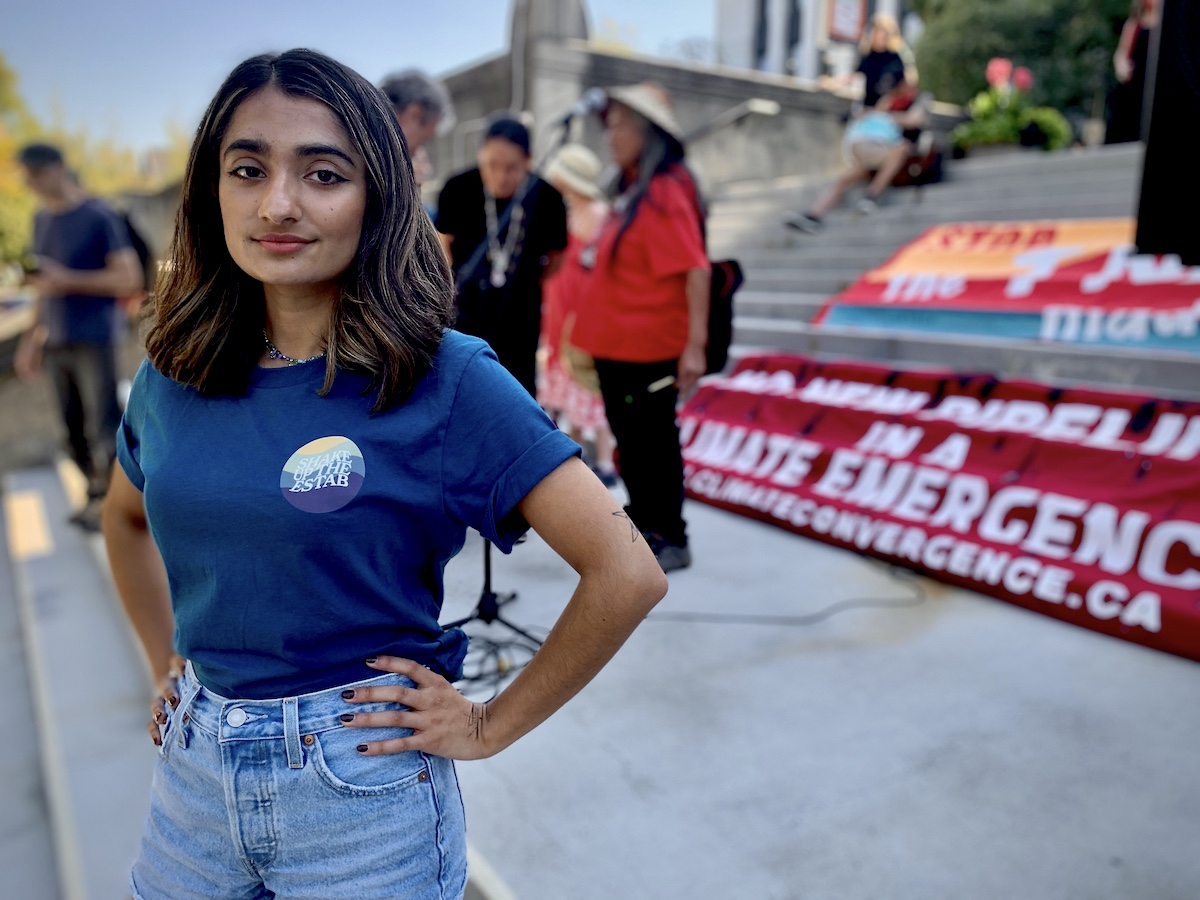Support strong Canadian climate journalism for 2025
A massive turnout for a youth-led climate protest in Vancouver Friday highlighted the rising frustration with the status quo as global warming and extreme weather events continue to skyrocket, say youth climate activists.
This shows that people are not willing to stand around for business as usual and we're looking to have some meaningful change,” youth activist-scholar Manvi Bhalla, president of the Shake Up The Establishment advocacy group, told Canada’s National Observer before addressing the crowd at the Vancouver Art Gallery.
“This is a peaceful initiative, but it’s disruptive, underscoring that business as usual is not working for us and something needs to fundamentally change.”
The demand is straightforward, Bhalla said.
“We want an end to fossil fuels in all contexts. Our ask is it’s fast, fair and forever.”

Thousands converged at Vancouver's city hall for the youth-led global climate strike before marching across the Cambie Street Bridge to the Vancouver Art Gallery, where Indigenous leaders, activists, speakers and artists took to the stage.
The Vancouver protest is part of a global wave of actions — including Greta Thunberg’s Fridays for Future movement — demanding the end of fossil fuels after the planet and our country were savaged by record heat, savage wildfires, flooding and other climate extremes this summer.
Schoolchildren, student organizers, parents, professionals, seniors and just about anyone concerned about the shocking rise of extreme climate events and the failure of governments to wind down the oil and gas industry are taking part in the march, said university student and community organizer José Reyeros Sánchez.
The Canadian government needs to implement a strong fair and immediate emissions cap on top of the carbon tax,” he said.
“The emissions policy was first promised by the Liberals more than two years ago, and the cap has been delayed again and again,” Sánchez said.
The B.C. government also has to end the expansion of LNG markets, phase out fracking of natural gas and stop the logging of old-growth forests, he added.
The strike is being co-ordinated by a collective of local grassroots groups, including Climate Convergence, For Our Kids Vancouver and Burnaby, Force of Nature, Doctors for Planetary Health, and Fridays for the Future Vancouver.
The federal and provincial governments are succumbing to the fossil fuel sector and industry lobbying, Sánchez said.
Prime Minister Justin Trudeau must stand up to oil and gas companies and deliver policies that put Canadians’ health and future over the profits of big polluters, he stressed.

B.C. was scorched by a summer of fire and drought, which drives up people’s grief and eco-anxiety, Sánchez said.
“Youth are dealing with these emotions more than any other generation has done,” he said.
But there is a lot of joy, hope and empowerment when they organize and act collectively at a grassroots level.
“We can still look for hope.
We just need to work and do it together.”

Rochelle Baker / Local Journalism Initiative / Canada's National Observer






Comments
I trust they took transit.
I think we know that protest actions aren't going to do much. It's about the voting, and whom you have to choose from when you vote. Parties need to change platforms.
We can't vote with our dollars very well; we aren't given green choices to spend upon. It is, sadly going to have to be democracy and regulation. The old world won't go quietly.
If young people are so concerned about climate change, why would many of them consider voting conservative, a party that won't recognize that climate change is real?
Good grief!! I wonder if either of you have actually participated in a climate strike/march/gathering lately and LISTENED to what the young people are saying...!! We elders - the ones with our heads in the sand - don't bother considering anyone's future except our own, which will end in imminent death, so why should we get upset. I'm not sure how you missed it, but young people today are EXASPERATED by their dismal-looking futures, and one of the only ways they can enable themselves to go to bed at night and get up the next day is to join with other like-mindeds - INCLUDING many elders like me - and share their points of view. And believe it or not, there are some politicians who understand the urgency and are pushing for better policy. Oh - don't forget - many of these brilliant young people CAN'T VOTE yet!!!
I completely agree with Penny. Sheesh.
Exactly who would you vote for for strong climate action? Our only hope is for the climate justice movement to grow until the capture of governments by the fossil fuel industry is broken. We're nowhere near that point yet, but giving up isn't a option - and history is full of extremely rapid change.
Next time, join the youth.